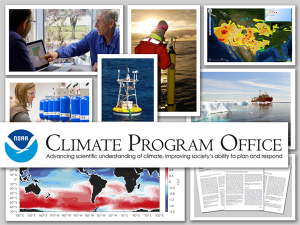NOAA’s Climate Program Office awards $22.3 million to advance climate science
 NOAA’s Climate Program Office (CPO) has awarded more than $22.3 million to support 77 multi-year projects conducted by research partners. With these new awards, CPO helps improve the breadth and scope of climate research, and offers opportunities for collaboration within and integration between programs. Potential research results will likely have impacts far beyond individual projects and funding programs.
NOAA’s Climate Program Office (CPO) has awarded more than $22.3 million to support 77 multi-year projects conducted by research partners. With these new awards, CPO helps improve the breadth and scope of climate research, and offers opportunities for collaboration within and integration between programs. Potential research results will likely have impacts far beyond individual projects and funding programs.
“The nation and the world are increasingly more aware of the importance of having access to timely and relevant climate science and information, and CPO enables the shaping of that body of knowledge through its competitive grants,” said Wayne Higgins, director of NOAA’s Climate Program Office. “The awards range from local to global, and show the diversity of our program’s research portfolio. Whether it’s advancing global modeling, understanding Arctic processes or helping states and municipalities cope with drought, CPO is proud of its unique role in advancing scientific understanding.”
CPO manages competitive research programs which fund high-priority climate science, assessments, decision support research, outreach, education, and capacity-building activities. While each competition had its own focus, together they demonstrated the agency’s commitment to advancing integrated climate research and enhancing society’s ability to plan and respond to climate variability and climate change.
In FY 2014, the Climate Program Office awarded new grants through its four major grant programs:
The Climate Observations and Monitoring Division (COM) awarded more than $2.9 million to support 10 new multi-year projects. This funding will support research to develop new data sets and information products that will help scientists, policy makers, and the public make complex sensitive climate-related decisions. New research will also improve understanding of key aspects of weather and climate extremes–events such as heat waves, droughts, and floods that have significant impacts on important natural and human systems like energy, agriculture, water, and human health. Other projects will focus on better understanding the important two-way relationship between the world’s oceans and climate, and pioneer development of a set of ocean climate indicators.
Earth System Science (ESS) comprises two different programs—Climate Variability & Predictability (CVP) and Atmospheric, Chemistry, Carbon Cycle, & Climate (AC4).
The CVP program awarded $3.1 million to support 7 multi-year projects from partnering institutions. CVP’s funding will help improve the understanding of tropical Pacific processes, observations, and climatology.
The AC4 program awarded $6.7 million to fund 17 projects focused on studying urban emissions, emissions from the U.S. Southeast, emissions from oil and gas extraction, and deposition processes.
The Modeling, Analysis, Predictions, and Projections (MAPP) program funded two distinct competitions this year.
MAPP awarded $4.3 million to support 17 new multi-year projects in which university partners and federal researchers will work to improve our understanding of drought, and advance NOAA’s prediction and monitoring capabilities to better anticipate and respond to drought.
MAPP also awarded $1.8 million to support 10 new multi-year projects designed to improve NOAA’s climate predictions from two weeks to a year in advance, including extreme conditions. These projects will contribute to the NOAA Climate Test Bed, aimed at accelerating research-based advances in climate prediction and transitioning new tools and techniques to NOAA’s operational services.
The Climate and Societal Interactions (CSI) program funded 16 new starts for $3.5 million.
The Coastal and Ocean Climate Applications (COCA) program addresses the needs of specific decision makers grappling with pressing climate-related issues in coastal and marine environments. COCA funded five new project starts for $1.1 million.
The Regional Integrated Sciences & Assessments (RISA) program supports research teams that help expand and build the nation’s capacity to prepare for and adapt to climate variability and change. RISA and Assessments funded three new project starts for $423,000.
The Sectoral Application Research Program (SARP) aims to support stakeholders within key socioeconomic sectors such as water resources, agricultural, and health, who are grappling with pressing climate-related issues. SARP funded five new project starts for $1.1 million to help support interdisciplinary research to advance understanding of how climate variability and change affect key socio-economic sectors. The projects will also aim to help promote the application of this new knowledge in climate-related decisions.
SARP’s Coping with Drought initiative supports research projects that advance state-of-the-art drought planning, including scientific analyses of drought events, outlooks and risk assessments, management best practices, and addressing socioeconomic and institutional challenges. The Coping with Drought initiative funded three new program starts for $883,124.
To learn more about the Climate Program Office’s funding opportunities, visit: http://cpo.noaa.gov/GrantsandProjects.aspx
NOAA’s Climate Program Office helps improve understanding of climate variability and change in order to enhance society’s ability to plan and respond. NOAA provides science, data, and information that Americans want and need to understand how climate conditions are changing. Without NOAA’s long-term climate observing, monitoring, research, and modeling capabilities we couldn’t quantify where and how climate conditions have changed, nor could we predict where and how they’re likely to change.